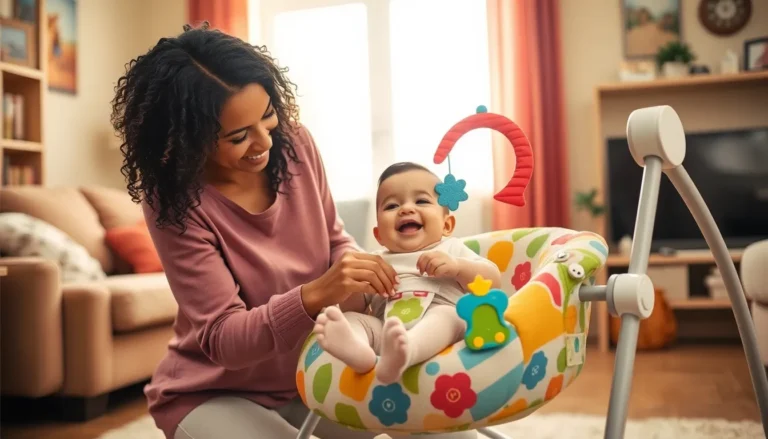Kissing newborn babies might seem like a harmless act of affection, but there’s more to it than meets the eye. While those tiny cheeks are irresistibly kissable, it’s crucial to consider the implications of smooching the littlest members of our family. After all, who wouldn’t want to shower a newborn with love? But is it safe, or could it lead to a mini health crisis?
Table of Contents
ToggleUnderstanding the Practice of Kissing Newborn Babies
Kissing newborn babies often evokes strong emotions, yet it is vital to consider health implications associated with this affectionate act.
Cultural Perspectives on Kissing
Across cultures, kissing newborns holds various meanings. In some societies, this gesture symbolizes love and familial connection. Many cultures regard kissing as a rite of passage, fostering bonds between family members. However, cultural norms influence perceptions of safety related to kissing infants. Some cultures discourage kissing on the mouth to prevent health risks. In contrast, other cultures embrace intimate contact, reinforcing communal bonds.
Common Practices Around the World
Practices surrounding kissing newborns vary widely across regions. In Western cultures, kissing the forehead or cheek is common, reflecting affection while minimizing health risks. Conversely, certain Asian cultures prioritize hand-holding and gentle touches over kissing to maintain hygiene. Specific countries maintain traditions of kissing the baby’s feet, which symbolizes blessings and protection. Health guidelines increasingly emphasize avoiding kisses on the face, especially from visitors, to reduce the transmission of germs and illnesses.
Health Considerations
Kissing newborns raises important health considerations that caregivers should take seriously. Understanding the associated risks and the vulnerable immune system can help prioritize the baby’s well-being.
Risks of Kissing Newborns
Kissing newborns may transmit infections and germs, posing a risk to their health. Bacterial and viral infections, such as cold sores and respiratory illnesses, can spread easily from adults to infants. Infants lack fully developed immune systems, making them particularly susceptible to these pathogens. Moreover, studies indicate that kissing on the mouth significantly increases exposure to harmful bacteria. Recognizing the signs of illness in visitors is crucial, as seemingly harmless kisses may lead to serious health concerns for newborns.
Immune System of Newborns
Newborns have immature immune systems that develop further in their first year. Until six months old, babies rely on maternal antibodies for protection. This limited immunity highlights the importance of minimizing exposure to germs. Vaccination schedules begin around two months, but until then, avoiding close contact with sick individuals is vital. Newborns also benefit from a clean environment and reduced pathogen exposure. Ensuring good hygiene practices among caregivers significantly reduces infection risk, allowing newborns to thrive healthily.
Emotional and Developmental Benefits
Kissing newborns offers significant emotional and developmental advantages. These benefits arise from physical affection, which fosters secure attachments and encourages healthy growth.
Bonding Through Touch
Touch nurtures relationships between caregivers and newborns. Parents can establish trust through gentle contact, such as kisses on the forehead or cheeks. Bonding enhances emotional security, promoting a strong foundation for future social interactions. Babies respond positively to tender gestures, releasing oxytocin which strengthens their attachment to caregivers. As a result, consistent affection contributes to their overall well-being and emotional health.
Psychological Impact on Newborns
Kissing affects the psychological state of newborns in profound ways. Exposure to affectionate gestures fosters a sense of safety, which can decrease stress levels in infants. Creating a calm environment encourages optimal brain development. Research indicates that positive interactions promote confidence and resilience in later life stages. Healthy emotional development stems from these initial experiences of love and care, laying the groundwork for emotional regulation and interpersonal skills.
Best Practices for Safe Kissing
Kissing newborns can be an affectionate gesture, but it’s vital to approach this practice with care to ensure their safety.
When and How to Kiss a Newborn
Kissing a newborn should occur in a safe manner. Ideally, choose to kiss on the forehead or cheek instead of the mouth to minimize health risks. Observing the newborn’s reaction can also guide appropriate moments for physical affection. Timing matters; wait until the baby is settled and calm. Limiting kisses to close family members or caregivers who are healthy further reduces the chance of germ transmission. This thoughtful approach builds a nurturing bond while prioritizing the infant’s health.
Hygiene Tips for Parents and Visitors
Maintaining good hygiene is crucial before kissing a newborn. Parents should wash their hands thoroughly with soap and water to eliminate potential germs. For visitors, ensuring they are healthy before making contact is equally important. If anyone feels unwell, postponing the visit protects the newborn. Avoid kisses if there’s any sign of illness, such as a cold sore or cough. Covering the mouth when sneezing or coughing and refraining from kissing in close proximity ensures safety. Following these hygiene practices protects newborns from infections while allowing love and affection to flourish.
Kissing newborns can be a beautiful expression of love and connection but it’s essential to prioritize their health and safety. By understanding the potential risks and adopting safer practices, caregivers can enjoy the benefits of affectionate gestures while minimizing exposure to harmful germs.
Choosing to kiss on the forehead or cheek instead of the mouth is a simple yet effective way to show love without compromising the baby’s well-being. Encouraging healthy hygiene habits among family and visitors can further protect these vulnerable little ones.
Ultimately, nurturing bonds formed through safe affection lay the groundwork for emotional security and healthy development, ensuring that every kiss contributes positively to the baby’s growth and happiness.



